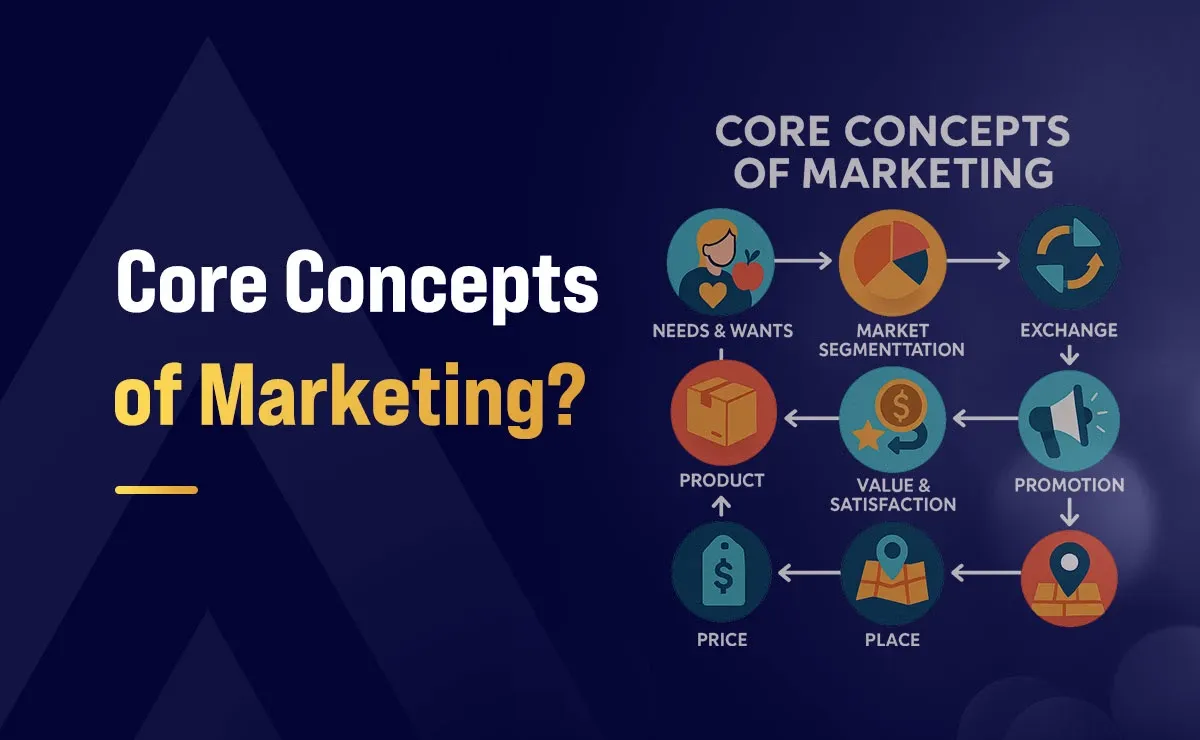What are the Core Concepts of Marketing?

Marketing is a complex business activity that extends beyond advertising and social media. It covers the full spectrum of value creation, including ideation and messaging, as well as the provision of solutions that best meet customer needs and expectations. Although the marketing process encompasses sales, advertising, and social media management, it is an all-encompassing process that incorporates all of the elements.
The digital transformation has significantly expanded marketing's scope and impact, making it one of the most sought-after career specializations. It has evolved to become a revenue-centric function that directly impacts a company's growth and success by focusing on building and delivering value to customers across both traditional and digital channels.
A solid understanding of the fundamentals of marketing concepts enables students to make informed decisions, effectively relate to customers, and drive business growth. Students at Altera Institute gain practical and real-life experience through their studies, equipping them with skills that enhance both career readiness and career placement. The programs at the institute are designed to help students apply marketing concepts with confidence in real-world situations.
Understanding Core Marketing Concepts
Let’s explore the concepts of marketing with examples.

Needs, Wants, and Demands
Needs
Fundamental human needs for existence and prosperity form the basis of our requirements. They arise when an individual feels deprived of something essential to their well-being. Marketers do not create needs; instead, they identify them and develop products to fulfill them.
Human needs can be classified into three categories:
- Basic physical needs: Food, water, clothing, shelter, and safety.
- Social needs: The need for belonging, relationships, and love.
- Personal needs: It include knowledge, personal development, and self-expression.
Wants
Culture, society, and individual preferences create wants. Contrary to needs, which are universal, wants tend to differ among individuals.
For example, although water is a need, a given brand of sparkling water is a want. These desires are influenced by marketers through branding, advertising, and cultural influences.
Demands
Demands arise when wants are backed by purchasing power. A person may want a luxury car, but it becomes a demand only when they can afford to buy it.
Marketers should develop products that meet the needs of their target audience and are affordable, taking into account their purchasing power.

Marketers and the Target Market.
Each business serves a particular customer segment, and this group must be identified by strategic analysis via:
- Segmentation: The division of large consumer groups into definite and manageable units with reference to lifestyle patterns, demographic and location factors, and behavioral patterns.
- Targeting: It involves identifying and targeting consumer segments with the best potential.
- Positioning: Creating a distinct positioning and perception in the minds of the target audience.
Successful marketers combine analytical learning, creative thinking, and research findings to develop strategies that foster customer loyalty. For example, Nike divides the market into lifestyle and athletic interests, appealing to fitness enthusiasts and marketing itself as a high-end brand that empowers athletes.
Marketing Mix (4Ps)
The marketing mix refers to the tactical components that a company uses to implement its marketing strategy. They are collectively known as the 4Ps of marketing:

- Product: The services or goods sold to satisfy the consumer's needs. This involves product attributes, design, quality, and branding.
- Price: It is the financial worth calculated based on the perceived benefits of the consumer, market competition, and the costs of the operations.
- Place: The series of distribution outlets and channels that provide products to the right places at the right time.
- Promotion: Long-term campaigns of strategic communication aimed at educating and persuading prospective customers, including advertising, marketing campaigns, and publicity.
Value Proposition
Value is the customer's perception of the product's capacity to satisfy their needs and wants in comparison to the price charged. It answers the key question: What makes this offer better than the others on the market?
Key Components of an Effective Value Proposition:
- Relevance: Demonstrates how your solution addresses specific pain points or enhances current situations.
- Price: This refers to the amount of money, time, and energy that the consumer invests in.
- Differentiation: Expresses yourself in terms of your distinct market position and competitive advantages over substitutes.
For instance, an ordinary mobile phone can offer great value when it contains desirable features at a reasonable price. On the other hand, a high-quality phone can be sold at a higher price with the help of technological innovations and unique services.
Customer Relationship Management (CRM)
Customer Relationship Management (CRM) is a method of systematically managing and maximizing every customer's touchpoint and interaction. In addition to sales, CRM focuses on studying consumer behaviors to make marketing strategies more effective and provide superior services that help create loyalty.
Essential CRM Approaches:
- Personalization: Designing personalized marketing messages and experiences in line with customer behaviors and preferences.
- Engagement: Actively involving customers through feedback loops, loyalty programs, and continuous communication.
- Retention: Keeping customers happy and encouraging repeat business through excellent service and relationship-building activities.
A successful CRM program leads to increased customer satisfaction, brand loyalty, and sustained revenue growth.
Digital Marketing

Digital marketing utilizes digital platforms, mobile technology, and internet-based marketing channels to build, convey, and transfer value to clients.
Important Digital Marketing Plans:
- Content Marketing: Creating and sharing valuable content to build and hold the audience's attention.
- SEO: Optimizing digital content to achieve prominent visibility in search engine results pages (SERPs).
- Social Media Marketing: Building customer relationships across platforms such as Instagram, Facebook, and Twitter through meaningful interaction.
- Email Marketing: Sending promotional messages and advertising to the inboxes of consumers.
Digital marketing provides real-time performance data, enabling marketers to refine and improve their strategies to achieve greater results.
FAQs
Q1. What are the core concepts of marketing management?
Ans: The core concepts of marketing incorporate understanding consumer needs, desires, purchasing power, value creation and satisfaction, transaction facilitation, relationship nurturing, market analysis, and stakeholder engagement.
These ideas are used to shape the strategies that organizations employ to meet customer needs, create value, and foster customer relationships.
Q2. Why are core concepts of marketing important?
Ans: The fundamental concepts of marketing are important in the sense that they enable companies to know how to behave towards customers, design valuable products, and develop significant relationships. With the implementation of these principles, companies would be able to address consumer needs successfully, achieve better customer satisfaction, and deliver successful sales, providing sustainable growth and a competitive advantage.
Summing Up
Learning the basics of marketing does not just stop at the theoretical level; it entails acquiring skills to create relevant relationships between the business and its clients.
In a world where markets are ever-changing, effective marketing requires a delicate balance between understanding human psychology, leveraging technology, and creating value. These principles serve as a guide to informed business decision-making and the establishment of long-lasting customer relationships, as markets remain dynamic, and consumer actions evolve over time.
No matter how much experience a person may have, internalizing these concepts will help them go beyond mere transactions, build genuine impact, and spur business development through genuine customer interactions.





